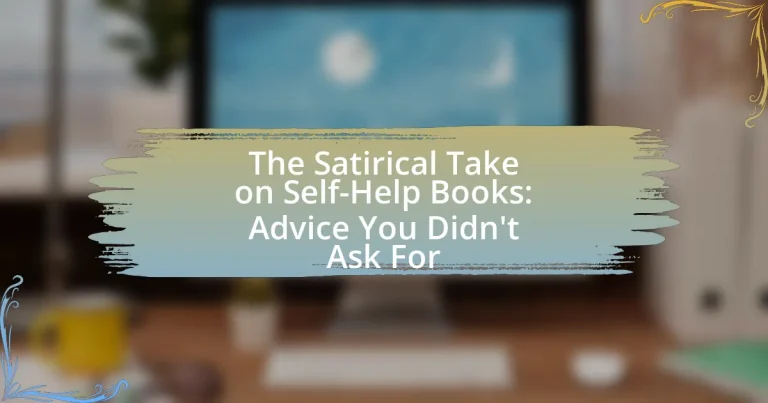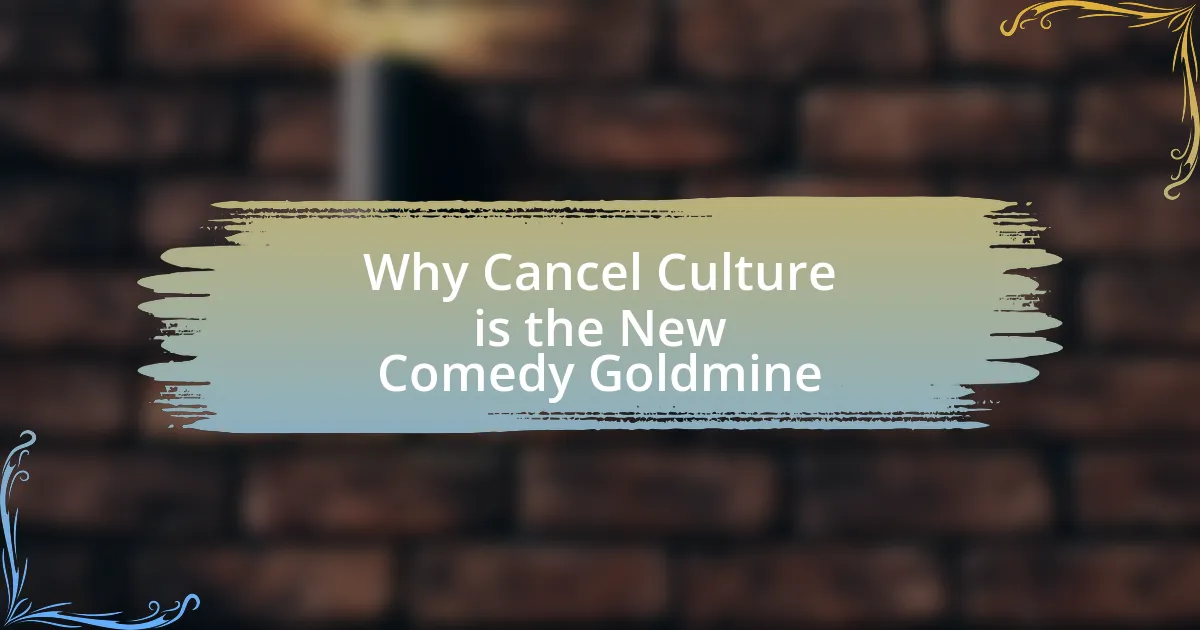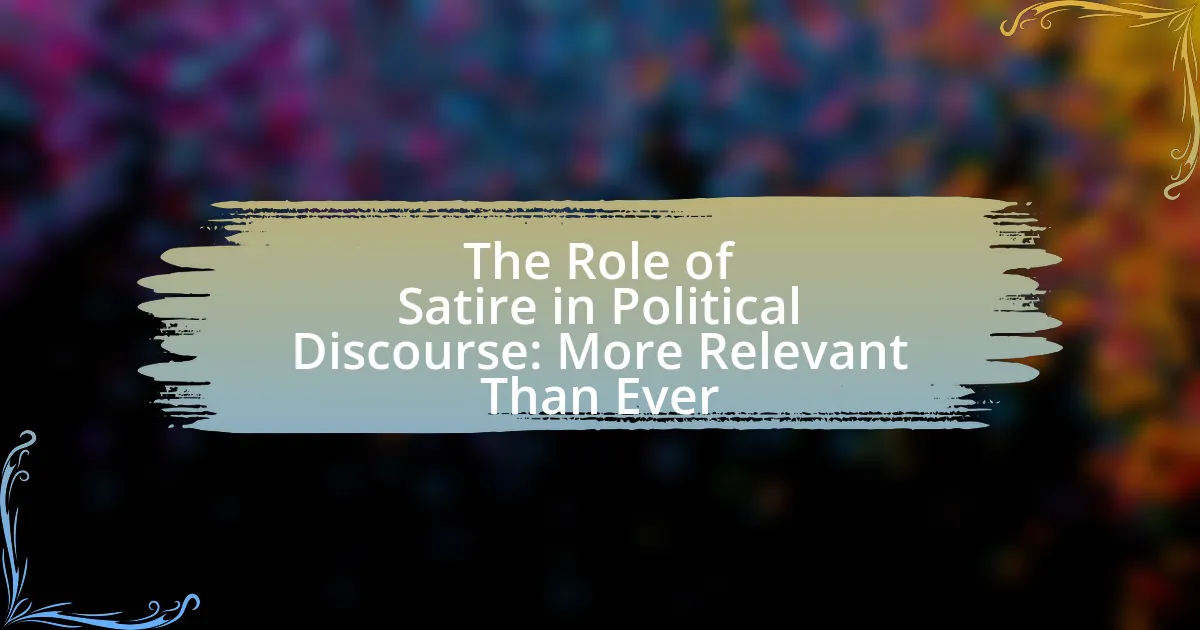The article examines the satirical perspective on self-help books, critiquing their unrealistic promises and oversimplified solutions to complex life challenges. It highlights how these books often present generic advice as universally applicable, ignoring individual circumstances, and emphasizes the absurdity of relying on formulaic guidance. Key themes include the critique of conventional self-help advice, the use of humor to expose the flaws in personal development trends, and notable examples of satirical self-help literature that challenge traditional narratives. The article also discusses the role of humor in enhancing critical thinking and the importance of discerning valuable advice from satire.
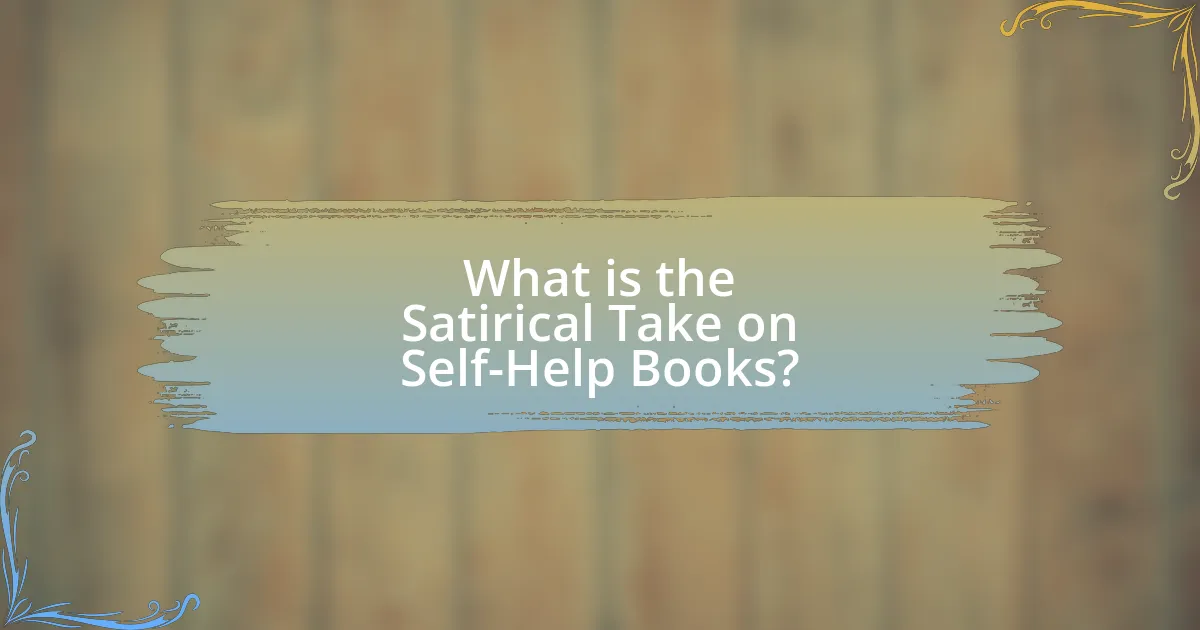
What is the Satirical Take on Self-Help Books?
The satirical take on self-help books critiques their often unrealistic promises and oversimplified solutions to complex life issues. This perspective highlights how these books frequently present generic advice as universally applicable, ignoring individual circumstances. For instance, a common trope in self-help literature is the assertion that positive thinking alone can lead to success, which disregards the multifaceted nature of personal and professional challenges. Satire in this context serves to expose the absurdity of relying on formulaic guidance, suggesting that readers may be better off seeking authentic, personalized support rather than adhering to one-size-fits-all prescriptions.
How do self-help books typically present advice?
Self-help books typically present advice in a structured format that includes practical steps, anecdotes, and motivational language. These books often break down complex concepts into easily digestible sections, using bullet points or numbered lists to enhance clarity. For example, many self-help authors incorporate personal stories or case studies to illustrate their points, making the advice relatable and actionable. This method not only engages readers but also reinforces the credibility of the advice by providing real-life applications.
What common themes are found in self-help literature?
Common themes found in self-help literature include personal growth, self-awareness, and resilience. These themes often emphasize the importance of understanding oneself to foster improvement and overcome challenges. For instance, many self-help books advocate for setting goals and developing a positive mindset as essential steps toward achieving success. Research indicates that self-help literature frequently draws on psychological principles, such as cognitive-behavioral techniques, to promote behavioral change and emotional well-being.
How do self-help books claim to improve lives?
Self-help books claim to improve lives by providing readers with strategies and insights aimed at personal development and problem-solving. These books often present frameworks for understanding emotions, setting goals, and overcoming obstacles, which can lead to enhanced self-awareness and motivation. For instance, studies have shown that engaging with self-help literature can increase individuals’ belief in their ability to change, a concept known as self-efficacy, which is supported by Bandura’s research on the subject. Additionally, self-help books frequently include practical exercises and actionable advice, which can facilitate behavioral changes and promote mental well-being.
Why is satire used in discussing self-help books?
Satire is used in discussing self-help books to critique their often unrealistic promises and oversimplified solutions. By employing humor and exaggeration, satire highlights the absurdities within the self-help genre, revealing how these books can mislead readers into believing that personal transformation is easily achievable. For instance, satirical works may mock the formulaic nature of many self-help titles, pointing out that they frequently recycle the same advice without substantial evidence or practical application. This approach encourages critical thinking among readers, prompting them to question the validity of the advice presented and consider the complexities of personal development that are often overlooked in mainstream self-help literature.
What are the benefits of a satirical approach?
A satirical approach offers the benefit of highlighting societal issues through humor, making complex topics more accessible and engaging. This method encourages critical thinking by prompting audiences to reflect on the absurdities of certain beliefs or practices, particularly in the context of self-help literature. For instance, satire can expose the unrealistic expectations often promoted in self-help books, allowing readers to question the validity of such advice. Research indicates that humor can enhance retention of information, making satirical content more memorable and impactful.
How does satire highlight the absurdities of self-help advice?
Satire highlights the absurdities of self-help advice by exaggerating its often unrealistic and simplistic solutions to complex personal issues. For instance, satirical works like “The Subtle Art of Not Giving a F*ck” by Mark Manson critique the notion that one can achieve happiness through mere positive thinking, showcasing the impracticality of such advice. This form of humor exposes the contradictions and overgeneralizations prevalent in self-help literature, revealing how these books frequently promote quick fixes rather than addressing deeper psychological or societal problems. By using irony and wit, satire effectively underscores the disconnect between the promises made by self-help authors and the actual experiences of individuals seeking genuine improvement in their lives.
What are the characteristics of satirical self-help books?
Satirical self-help books are characterized by their humorous and ironic approach to conventional self-help themes. These books often exaggerate common advice, using wit to critique societal norms and the self-help industry itself. For instance, they may present absurd solutions to everyday problems, highlighting the ridiculousness of some self-help concepts. Additionally, they frequently employ parody, mocking the tone and style of traditional self-help literature, which allows readers to reflect on the often uncritical acceptance of such advice. This blend of humor and critique serves to entertain while simultaneously encouraging skepticism about the effectiveness of typical self-help strategies.
How do these books differ from traditional self-help literature?
These books differ from traditional self-help literature by employing satire to critique the genre’s common tropes and clichés. While traditional self-help books often present straightforward advice aimed at personal improvement, these satirical works highlight the absurdity of such advice, using humor to question the effectiveness and sincerity of conventional self-help methods. For example, they may exaggerate the promises made by self-help authors, illustrating how unrealistic expectations can lead to disillusionment. This approach not only entertains but also encourages readers to reflect critically on the self-help industry and its impact on personal development.
What tone and style are commonly used in satirical self-help books?
Satirical self-help books commonly employ a humorous and irreverent tone, often using sarcasm and exaggeration to critique traditional self-help advice. This style allows authors to highlight the absurdities of conventional wisdom while engaging readers through wit and playful language. For instance, books like “The Subtle Art of Not Giving a F*ck” by Mark Manson utilize blunt humor and candid observations to challenge societal norms, demonstrating how satire can effectively convey deeper truths about personal development.
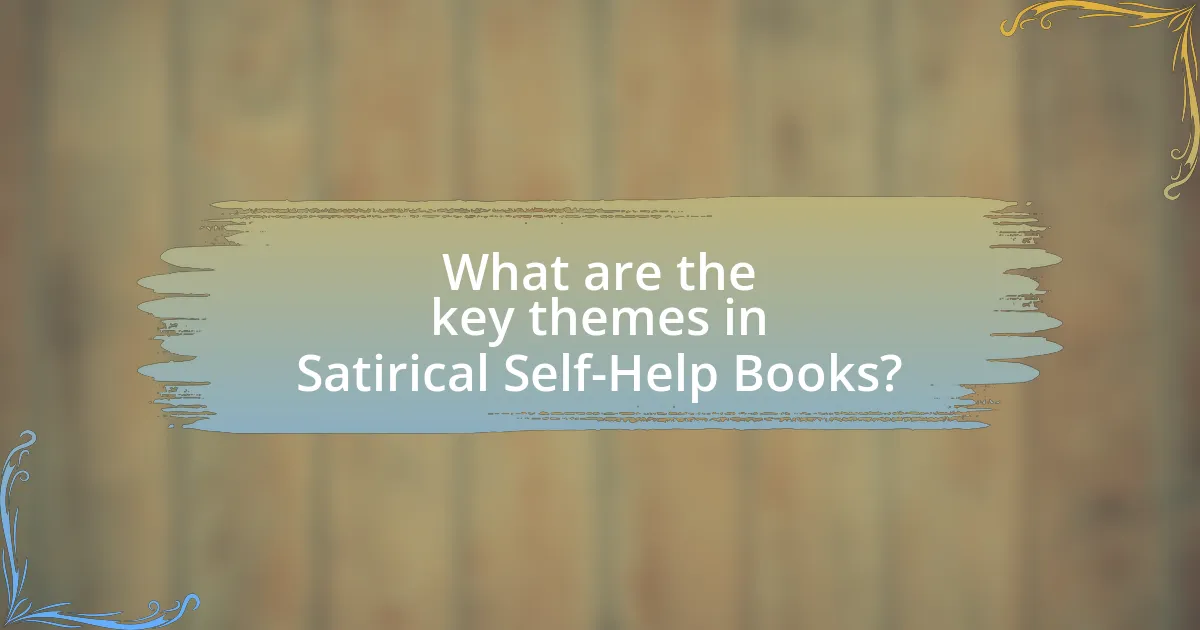
What are the key themes in Satirical Self-Help Books?
Key themes in satirical self-help books include the critique of conventional self-help advice, the absurdity of personal development trends, and the exploration of human flaws and societal expectations. These books often highlight the irony in self-improvement narratives, using humor to expose the unrealistic standards set by mainstream self-help literature. For instance, they may mock the idea that anyone can achieve success through simple affirmations or that happiness is a linear journey. By employing satire, these works encourage readers to question the validity of popular advice and reflect on their own experiences, ultimately promoting a more nuanced understanding of personal growth.
How do satirical self-help books critique personal development trends?
Satirical self-help books critique personal development trends by exaggerating the absurdities and contradictions inherent in mainstream self-help advice. These books often employ humor and irony to highlight how conventional wisdom can lead to unrealistic expectations and superficial solutions, thus exposing the flaws in the personal development industry. For instance, works like “The Subtle Art of Not Giving a F*ck” by Mark Manson challenge the notion that positivity alone can solve deep-seated issues, suggesting instead that embracing discomfort is essential for genuine growth. This critique is reinforced by the observation that many self-help trends prioritize quick fixes over meaningful change, ultimately questioning the effectiveness and sincerity of the personal development movement.
What specific trends are often targeted in these critiques?
Critiques of self-help books often target trends such as oversimplification of complex issues, reliance on anecdotal evidence, and the promotion of unrealistic expectations. These critiques highlight how many self-help authors present solutions that ignore the nuances of individual circumstances, often using personal success stories as the primary basis for their advice, which can mislead readers into believing that similar results are universally achievable. For instance, studies have shown that self-help books frequently lack empirical support, leading to skepticism about their effectiveness and validity.
How do these critiques resonate with readers?
Critiques of self-help books resonate with readers by highlighting the absurdity and often unrealistic nature of the advice presented. Many readers find that these critiques reflect their own frustrations with the genre, as they recognize the oversimplification of complex issues and the commercialization of personal growth. For instance, a survey conducted by the Pew Research Center found that 60% of respondents felt self-help books often provide generic solutions that do not address individual circumstances. This connection fosters a sense of validation among readers, as they see their skepticism mirrored in the critiques, reinforcing their critical perspective on the self-help industry.
What role does humor play in satirical self-help books?
Humor serves as a critical mechanism in satirical self-help books by engaging readers while simultaneously critiquing conventional self-help advice. This comedic approach allows authors to highlight the absurdities and contradictions within traditional self-help narratives, making the content more relatable and thought-provoking. For instance, by employing irony and exaggeration, these books can effectively expose the unrealistic expectations often promoted in mainstream self-help literature, encouraging readers to question the validity of such advice. The use of humor not only entertains but also fosters a deeper understanding of the underlying issues, making the critique more impactful and memorable.
How does humor enhance the message of the satire?
Humor enhances the message of satire by making critical observations more palatable and engaging for the audience. In the context of self-help books, humor allows the satirist to highlight absurdities and contradictions in the advice offered, encouraging readers to reflect on the often unrealistic expectations set by these books. For example, a satirical piece might use exaggerated scenarios or witty remarks to expose the superficiality of self-help clichés, prompting readers to question the validity of such advice. This comedic approach not only entertains but also fosters a deeper understanding of the underlying critique, making the message more impactful and memorable.
What are some examples of humor used effectively in these books?
Effective humor in self-help books often includes irony, exaggeration, and absurdity. For instance, authors may use ironic statements to highlight the contradictions in conventional advice, such as suggesting that procrastination is a valid strategy for achieving goals. Exaggeration can be seen in scenarios where the author describes extreme outcomes of following typical self-help advice, making the advice seem ludicrous. Absurdity is often employed through humorous anecdotes that illustrate the ridiculous lengths people go to in pursuit of self-improvement, such as attending a seminar on how to be more spontaneous. These techniques not only entertain but also provoke critical thinking about the advice being presented.
Why do readers gravitate towards satirical self-help books?
Readers gravitate towards satirical self-help books because they offer humor and critique of conventional self-help advice, making the content more relatable and engaging. This genre allows readers to reflect on their own lives while enjoying a comedic perspective on the often unrealistic expectations set by traditional self-help literature. Research indicates that humor can enhance cognitive processing, making the lessons more memorable and impactful. For instance, a study published in the Journal of Personality and Social Psychology found that humor can facilitate deeper understanding and retention of information, which supports the appeal of satirical self-help books.
What needs do these books fulfill for their audience?
These books fulfill the audience’s need for humor and critical reflection on self-help culture. By satirizing conventional self-help advice, they provide entertainment while encouraging readers to question the validity and effectiveness of mainstream self-help narratives. This approach resonates with individuals who seek both amusement and a deeper understanding of their personal development journeys, highlighting the absurdities often present in self-help literature.
How do readers perceive the value of satire in self-help?
Readers perceive the value of satire in self-help as a critical lens that exposes the absurdities and contradictions within conventional self-help narratives. This perception is reinforced by the ability of satire to highlight the often unrealistic promises made by self-help authors, prompting readers to question the validity of such advice. For instance, satirical works like “The Subtle Art of Not Giving a F*ck” by Mark Manson utilize humor to critique the oversimplification of complex life issues, allowing readers to engage with the material in a more reflective manner. This engagement fosters a deeper understanding of personal development, as readers recognize the limitations of traditional self-help approaches while appreciating the comedic elements that make the content more relatable.
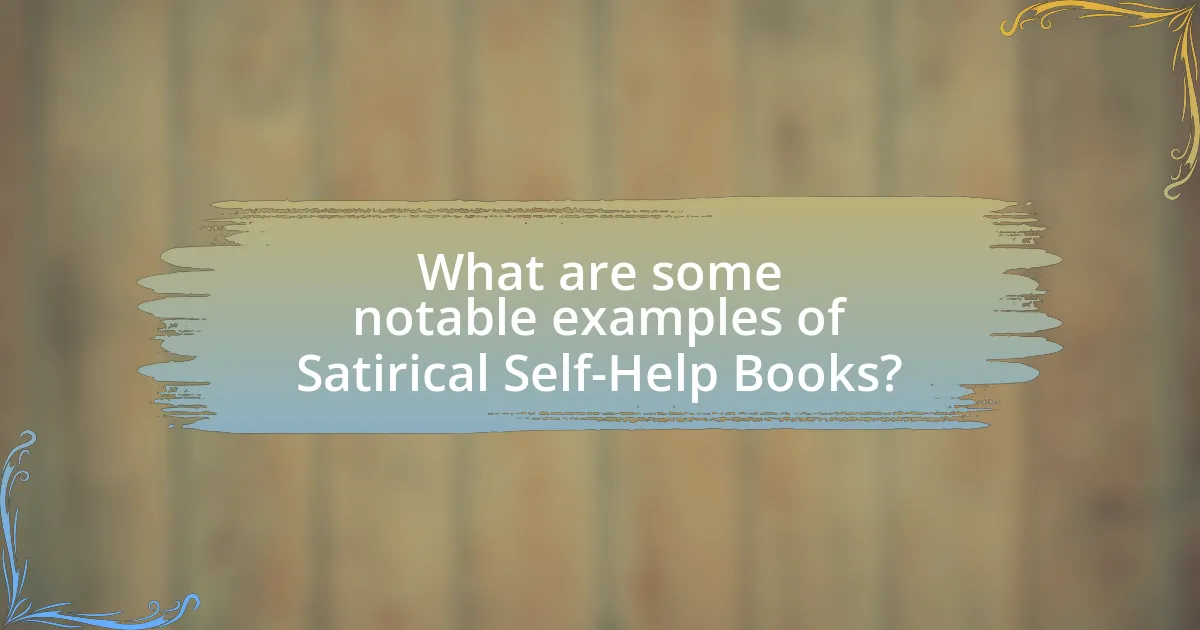
What are some notable examples of Satirical Self-Help Books?
Notable examples of satirical self-help books include “The Subtle Art of Not Giving a Fck” by Mark Manson, which critiques traditional self-help advice by promoting a more realistic approach to personal growth. Another example is “You Are a Badass” by Jen Sincero, which uses humor to challenge conventional motivational techniques. Additionally, “How to Be a Woman” by Caitlin Moran blends autobiography with satire to address societal expectations of women, while “The Life-Changing Magic of Not Giving a Fck” by Sarah Knight parodies Marie Kondo’s tidying philosophy by suggesting that people should declutter their emotional baggage instead. These books exemplify how satire can effectively critique and entertain within the self-help genre.
Which authors are known for their satirical takes on self-help?
Authors known for their satirical takes on self-help include David Sedaris, who often critiques self-help culture in his essays, and Chuck Palahniuk, whose novel “Fight Club” serves as a dark commentary on consumerism and self-improvement. Additionally, Sarah Knight’s “The Life-Changing Magic of Not Giving a F*ck” parodies traditional self-help advice by promoting a more irreverent approach to personal development. These authors effectively highlight the absurdities within the self-help genre, using humor and irony to challenge conventional wisdom.
What are the most popular titles in this genre?
The most popular titles in the genre of satirical self-help books include “The Subtle Art of Not Giving a Fck” by Mark Manson, “You Are a Badass” by Jen Sincero, and “How to Be a Bawse” by Lilly Singh. These titles have gained significant attention and sales, with “The Subtle Art of Not Giving a Fck” selling over 8 million copies since its release in 2016, highlighting its widespread appeal and resonance with readers seeking humor alongside self-improvement.
How have these books impacted the self-help industry?
These books have significantly influenced the self-help industry by introducing humor and satire, which challenge conventional advice and encourage critical thinking among readers. This shift has led to a diversification of self-help literature, as authors like David Sedaris and Sarah Knight use wit to address personal development topics, making them more relatable and accessible. The impact is evident in the growing popularity of satirical self-help titles, which have seen increased sales and engagement, reflecting a market trend that values authenticity and humor over traditional, prescriptive advice.
What lessons can be learned from satirical self-help books?
Satirical self-help books teach readers to critically evaluate conventional wisdom and recognize the absurdities in self-improvement culture. These books often exaggerate common self-help tropes, highlighting the unrealistic expectations and superficial solutions that many traditional guides promote. For instance, works like “The Subtle Art of Not Giving a F*ck” by Mark Manson critique the relentless positivity often found in self-help literature, encouraging readers to embrace life’s challenges instead. This approach fosters a more realistic understanding of personal growth, emphasizing authenticity over superficial success.
How can readers apply satire to their own self-help journeys?
Readers can apply satire to their self-help journeys by using humor to critically evaluate the advice they encounter. This approach allows individuals to recognize the absurdities in conventional self-help narratives, fostering a more discerning mindset. For instance, by mocking overly simplistic solutions or exaggerated claims, readers can distance themselves from unrealistic expectations, leading to a healthier perspective on personal growth. Satirical commentary often highlights the contradictions within self-help literature, encouraging readers to question the validity of the advice and to seek more nuanced, evidence-based approaches to their challenges.
What insights do these books provide about personal growth?
These books provide insights into the often exaggerated promises of personal growth, highlighting the gap between realistic self-improvement and the idealized versions presented in self-help literature. They critique the notion that quick fixes or simplistic advice can lead to profound change, emphasizing that true personal growth requires sustained effort, self-reflection, and a willingness to confront uncomfortable truths. For instance, studies show that long-term behavioral change is more effective when individuals engage in consistent practice and self-assessment rather than relying solely on external guidance.
What practical tips can readers take from satirical self-help books?
Readers can take practical tips from satirical self-help books by recognizing the absurdity in conventional advice and applying humor to their own life challenges. These books often exaggerate common self-help themes, encouraging readers to question the validity of mainstream advice and to adopt a more critical perspective on personal development. For instance, a satirical book may suggest that instead of striving for perfection, one should embrace their flaws as a source of uniqueness, thereby promoting self-acceptance. This approach can lead to reduced anxiety and a more authentic self-image, as supported by psychological studies indicating that humor can enhance coping mechanisms and resilience.
How can one discern valuable advice from satire?
To discern valuable advice from satire, one must analyze the intent and context of the message. Valuable advice typically aims to provide constructive guidance or insights, while satire often exaggerates or mocks a subject to provoke thought or entertain. For instance, a self-help book that offers practical strategies for personal growth is likely to be genuine, whereas a satirical piece may use humor to critique the self-help industry itself, highlighting its absurdities. Recognizing the tone, language, and underlying message can help differentiate between the two; satire often employs irony and hyperbole, while valuable advice is straightforward and actionable.
What are the best practices for engaging with satirical self-help literature?
To effectively engage with satirical self-help literature, readers should maintain a critical mindset while appreciating the humor. This approach allows individuals to discern the underlying messages and critiques of conventional self-help advice. Engaging with such literature involves recognizing the exaggeration and irony often employed to highlight societal norms and personal development trends. For instance, understanding that the absurdity in titles or scenarios serves to provoke thought about real-life issues can enhance the reading experience. Additionally, discussing the content with others can provide diverse perspectives, enriching comprehension and enjoyment.
